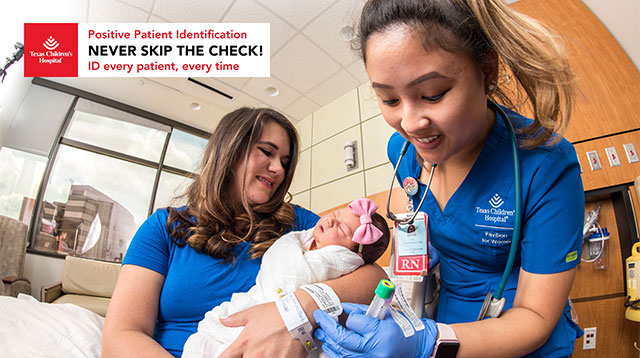
More than 1 million patients are harmed each year in the United States because of medical errors. The most common, yet preventable types of medical errors are those involving patient misidentification.
Collecting blood specimen and other lab results from patients is more than just placing a label on a tube. It’s a complex, multi-step process that involves meticulously checking and re-checking to ensure that the specimen being collected, labeled, processed and handled matches the right patient, every time.
“We know that safe, quality care for every patient at Texas Children’s is the most important responsibility of each staff member and employee here,” said Texas Children’s Vice President Trudy Leidich. “While no hospital is completely immune to medical errors, Texas Children’s continues to take proactive steps to improve the positive patient identification process in order to eliminate preventable harm to our patients.”
In conjunction with World Patient Safety Day on September 17, Texas Children’s has launched a new campaign – Don’t Skip the Check: ID every patient, every time – to engage our employees system wide around PPID efforts and to ensure error prevention alertness and accountability are always top of mind.
“We have several teams anchored around specific PPID goals,” said Denise Tanner-Brown, Director of Patient Care Services at Texas Children’s Hospital West Campus. “They’ve helped us assess and refine our PPID processes and develop learning principles that translate into safe practice at the point of care.”
Since one of the top safety risks nationwide is misidentification, Texas Children’s PPID leaders took an introspective look at our organization to re-assess and identify our potential safety risks. As part of our PPID improvement efforts, the Quality and Safety teams reviewed safety scoops from March 2018 to February 2019, and found that mislabeled specimens was by far the greatest risk of preventable harm.
“Our review of near miss safety events were invaluable lessons for us,” said Nicole Crews, a nurse practitioner in Pathology and Transfusion Safety Officer for the PPID Leadership Team. “By comparing these data trends, we saw what areas we’ve improved upon and what areas need more reinforcement, which subsequently has helped us proactively address these issues and remove barriers to success.”
PPID education roll-out plan – what to expect
The PPID education roll-out initiative will be conducted in several phases across the organization for clinical staff as well as nonclinical employees who have direct encounters with patients and their families.
The training modules accessible via Health Stream include an overview of Texas Children’s PPID policies and processes during blood specimen collection, processing and blood product handling. The modules also include patient families’ stories about misidentification to underscore the important role each of us play in helping to cultivate a harm-free environment for our patients and families at Texas Children’s.
To further drive home this message, the PPID Leadership team collaborated with Marketing to produce electronic slides and screen savers with our call-to-action messaging – Don’t skip the check: ID every patient, every time – that will be used across our three hospital campuses to keep positive patient identification top of mind. Posters will also be placed in our patient units to serve as a visible reminder.
In addition to this, Texas Children’s PPID campaign also includes efforts to educate our patients and families about the importance of wearing ID bands at all times while in our care to ensure their safety.
“September 17 marks a cultural revolution at Texas Children’s Hospital,” said Associate Chief Nursing Officer Jackie Ward, and executive co-sponsor of the PPID Initiative. “We want to ensure every patient has a positive PPID experience and that we’re providing the right care to the right patient every time.”

